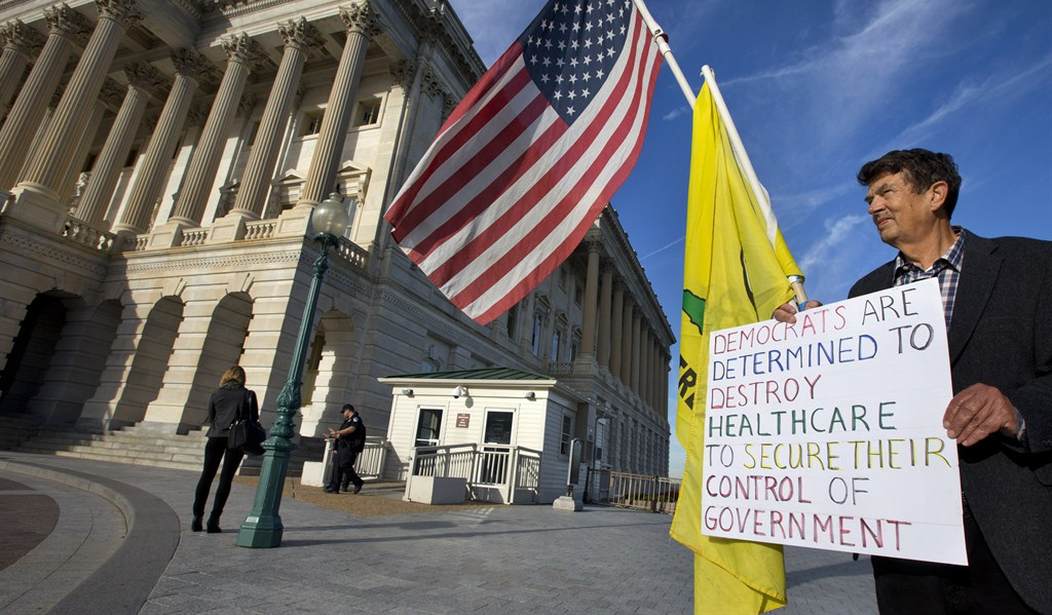"If you like your health insurance you can keep it," Barack Obama promised the voters on many occasions.
About 20,000 part-time employees of Home Depot recently found out how false that promise is. The company announced that it is ending its health insurance coverage for its employees and sending them to the new health insurance exchanges.
They will be joined by employees of McDonald's, Disney, CVS Caremark, Staples, Blockbuster, and many others.
A lot of these employers have mini med plans with limited coverage. McDonald's, for example, has a plan that limits health insurance benefit to $2,000 but gives employees the option to pay a higher premium and get $3,000 or $4,000 of coverage. At Home Depot, the coverage reaches $5,000. The state of Tennessee, under TennCare, used mini med plans with a $25,000 annual cap on benefits.
Mini med plans typically have no deductible. They usually charge a modest copayment for physician visits and drugs. But if a McDonald's employee goes into a hospital, the co-insurance rate is 30% and the plan's benefit cap will probably be blown right through after the first 30 minutes of admission.
These plans are being abolished under ObamaCare and if the employees end up in one of the new health insurance exchanges they will get subsidized insurance that will look very different. For one thing, the premium the employee pays will double and for many it will more than double. Then they will face, say, a $1,500 deductible for individual coverage. Surprisingly, if the employee goes into a hospital he faces a 20% copayment (comparable to the mini med plans!), but the total out of pocket exposure is limited to $2,250.
Now, which of these plans is better? For the orthodox health policy community, this isn't even a serious question. That's because they live in neighborhoods and associate with people who would never even consider buying mini med coverage. And, remember, imposing one's worldview on others is 90% of what liberalism is all about.
Recommended
But would you be surprised to learn that there are many people who would find the mini med plan more attractive?
Let's begin by asking why anyone wants insurance. In every other field, the answer is obvious. Insurance protects assets. Life insurance protects the value of human capital. Fire and casualty insurance protects homes, cars and other structures. People are willing to pay a premium to transfer the risk of a financial catastrophe to others. The same should be true in health care as well. Health insurance is a way of protecting one's financial resources against the expense of a catastrophic illness.
But if you don't own a house, you have no need for homeowners insurance. If you don't own a car, you have no need for auto casualty insurance. Similarly, if you have no assets at all (other than your human capital) why would you want health insurance?
For low and moderate income households, the reason why mini med plans are attractive seems to be this: People living paycheck to paycheck have trouble maintaining a reserve for unexpected medical expenses. So as an alternative to personal savings and higher wages, they appear to be willing to take less in take home pay in return for a modest amount of health insurance.
Okay, all that is rational. But what would be irrational is to buy a health insurance plan with an unlimited benefit ? one that, say, is able to pay a $1 million medical bill. Why would you buy a million dollars' worth of coverage, if you don't have a million dollars of assets to protect?
In the modern era, a perverse idea seems to have dominated the health policy community. The idea is that the purpose of health insurance is not to protect assets. It is to provide access to health care.
That might make some sense if it were really true. But the fact is that we have made it extremely easy in this country to obtain health insurance after you get sick. More than 90% of all the people with health insurance are in a plan that cannot deny them admission because of a health condition. For the elderly and the poor, it's 100%. In saying what I am about to say, let me preface by saying that I am aware that there are many very, very bad studies claiming that health insurance saves lives, improves health, etc. But when serious scholars have looked at this question, the reasons to think that health insurance affects mortality or health status are few. If health insurance affects health at all, the effect is marginal.
So, back to the original question. If you are making say, $15, $20 or $25 an hour, the ObamaCare plan is unlikely to look very attractive. Yes, it provides catastrophic insurance, which the mini med plan does not. But if you have a catastrophic medical event without ObamaCare insurance, odds are that you will be able to rely on the social safety net ? uncompensated care or even Medicaid. And if that doesn't work, odds are that you or a member of your family will be able to sign up for an employer plan that pays full expenses.
People with modest incomes are going to need help from others if they have a catastrophic medical event. What's the best way of getting help? Is it by obtaining subsidized health insurance with high deductibles and high out-of-pocket payments? Or is it through obtaining help to pay medical bills after the event occurs?
Ironically, the very people that ObamaCare is designed to help may be the ones most hurt by its enactment.
But I am open to the possibility that I am wrong. So let's entertain a market test. Instead of abolishing mini med plans, let people choose between those plans and ObamaCare's mandated benefits. Let's give people what they want.

























Join the conversation as a VIP Member